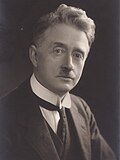The 1938 Irish general election to the 10th Dáil was held on Friday, 17 June following the dissolution of the 9th Dáil on 27 May 1938 by the Presidential Commission on the request of Taoiseach Éamon de Valera. It was a snap election, less than a year after the previous election, the proximate cause being the government's loss of an opposition motion recommending use of arbitration to resolve Civil Service labour disputes.[3] The general election took place in 34 parliamentary constituencies throughout Ireland for 138 seats in Dáil Éireann. It was the first election held after the coming into force of the Constitution of Ireland on 29 December 1937. Fianna Fáil won the first overall majority in the history of the State.
| |||||||||||||||||||||||||||||||||||||||||||||||||
138 seats in Dáil Éireann[a] 70 seats needed for a majority | |||||||||||||||||||||||||||||||||||||||||||||||||
|---|---|---|---|---|---|---|---|---|---|---|---|---|---|---|---|---|---|---|---|---|---|---|---|---|---|---|---|---|---|---|---|---|---|---|---|---|---|---|---|---|---|---|---|---|---|---|---|---|---|
| Turnout | 76.7% | ||||||||||||||||||||||||||||||||||||||||||||||||
| |||||||||||||||||||||||||||||||||||||||||||||||||
 Percentage of seats gained by each of the three major parties, and number of seats gained by smaller parties and independents. | |||||||||||||||||||||||||||||||||||||||||||||||||
| |||||||||||||||||||||||||||||||||||||||||||||||||
The 10th Dáil met at Leinster House on 30 June to nominate the Taoiseach for appointment by President Douglas Hyde and to approve the appointment of a new government of Ireland on the nomination of the Taoiseach. Outgoing Taoiseach Éamon de Valera was re-appointed leading a single-party Fianna Fáil government.
Result
edit| Election to the 10th Dáil – 17 June 1938[4][5][6] | ||||||||
|---|---|---|---|---|---|---|---|---|
| Party | Leader | Seats | ± | % of seats |
First pref. votes |
% FPv | ±% | |
| Fianna Fáil | Éamon de Valera | 77[a] | +8 | 55.8 | 667,996 | 51.9 | +6.7 | |
| Fine Gael | W. T. Cosgrave | 45 | –3 | 32.6 | 428,633 | 33.3 | –1.5 | |
| Labour | William Norton | 9 | –4 | 6.5 | 128,945 | 10.0 | –0.3 | |
| Independent | N/A | 7 | –1 | 5.1 | 60,685 | 4.7 | –5.0 | |
| Spoilt votes | 15,811 | — | — | |||||
| Total | 138 | 0 | 100 | 1,302,070 | 100 | — | ||
| Electorate/Turnout | 1,770,422 | 76.7% | — | |||||
Voting summary
editSeats summary
editGovernment formation
editFianna Fáil formed a majority government, the 2nd government of Ireland.
Changes in membership
editFirst time TDs
edit- Erskine H. Childers
- Daniel Hogan
- James Hughes
- Frank Loughman
- Henry McDevitt
- Thomas Mullen
- Peter O'Loghlen
- Mícheál Ó Móráin
Re-elected TDs
editOutgoing TDs
edit- Archie Heron (Lost seat)
- Gerrard McGowan (Retired)
- Edward Moane (Lost seat)
- Sydney Minch (Lost seat)
- Daniel O'Leary (Lost seat)
Seanad election
editThe election was followed by an election to the 3rd Seanad.
Notes
edit- ^ a b Including Frank Fahy, returned automatically for Galway East as outgoing Ceann Comhairle, under Art. 16.6 of the Constitution and the Electoral (Chairman of Dáil Éireann) Act 1937.[1][2]
References
edit- ^ Electoral (Chairman of Dail Eireann) Act 1937, s. 3: Re-election of outgoing Ceann Comhairle (No. 25 of 1937, s. 3). Enacted on 1 November 1937. Act of the Oireachtas. Retrieved from Irish Statute Book.
- ^ "10th Dáil 1937: Galway East". ElectionsIreland.org. Retrieved 3 July 2022.
- ^ "To Caesar". The Irish Times. 28 May 1938. p. 8. Retrieved 30 March 2020.; "Private Deputies' Business — Civil Service and Arbitration". Dáil Éireann (9th Dáil) debates. Houses of the Oireachtas. 25 May 1938. Archived from the original on 21 October 2019. Retrieved 30 March 2020.
- ^ "10th Dáil 1938 General Election". ElectionsIreland.org. Archived from the original on 3 June 2009. Retrieved 19 April 2009.
- ^ "Dáil elections since 1918". ARK Northern Ireland. Archived from the original on 27 November 2020. Retrieved 19 April 2009.
- ^ Nohlen, Dieter; Stöver, Philip (2010). Elections in Europe: A data handbook. Nomos. pp. 1009–1017. ISBN 978-3-8329-5609-7.


